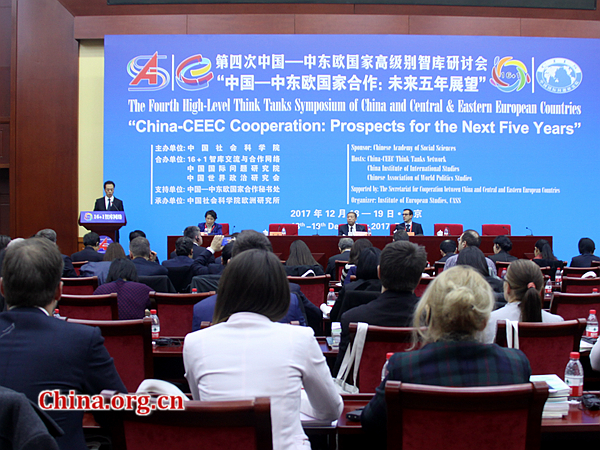Think tank symposium looks to China-CEEC cooperation prospects
- By Li Huiru
 0 Comment(s)
0 Comment(s) Print
Print E-mail China.org.cn, December 20, 2017
E-mail China.org.cn, December 20, 2017
The "16+1 Cooperation" mechanism has yielded fruitful achievements in the past five years and will continue to promote the development of bilateral relations between China and 16 Central and Eastern European countries, said experts attending the Fourth High-Level Think Tanks Symposium of China and Central & Eastern European Countries on Dec. 18-19.

"The prospects for the CEEC have become encouraging because with the 16+1 membership, which is a part of the B&R Initiative, the entire region was given the opportunity to overcome mutual prejudices and to begin to build relations based on partnership and not exclusively on the competition," said Branislav Djordjevic, director general of the Institute of International Politics and Economics from Belgrade in his speech at the plenary session of the symposium.
Echoing the theme of the symposium, "China-CEEC Cooperation: Prospects for the Next Five Years," Djordjevic said the most important are opening of communication between the CEECs and Chinese entrepreneurs and innovators who will enable the full utilization of the projects that have already been installed.
Wang Chao, China's vice foreign minister, spoke about the important progress made on "16+1 Cooperation" in 2017. In his speech, Wang pointed out that to promote the upgrading of the "16+1 Cooperation," the focus of the next phase of work must be based on cross-regional cooperation — cooperation should be carried out under the framework of China-EU All-round Strategic Partnership and the Belt and Road Initiative. Wang is also the secretary-general of the Secretariat for Cooperation between China and Central and Eastern European Countries.
Huang Ping, director-general of the Institute of European Studies, Chinese Academy of Social Sciences (CASS), talked about the prospects of China's economy. He said that developing a modernized economy is necessary for building a modern economic system. The core lies in the optimization and upgrading of industrial structure, the transformation of the economic development mode, and the drivers of economic growth. He stressed the importance of deepening reform and opening up in realizing these three forms of economic transformations.
The symposium is sponsored by the CASS and co-hosted by the China-CEEC Think Tanks Network, the China Institute of International Studies, and the Chinese Association of World Politics Studies. Nearly 300 government officials, university representatives, and experts and scholars from 16 think tanks in Central and Eastern European countries attended the two-day event.






Go to Forum >>0 Comment(s)